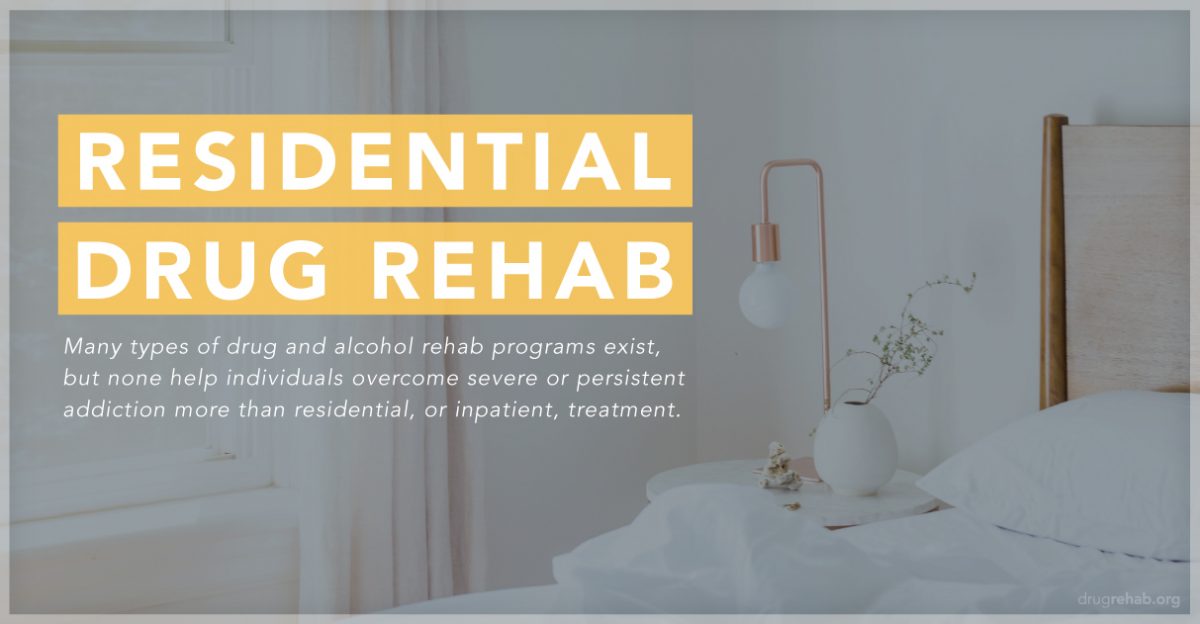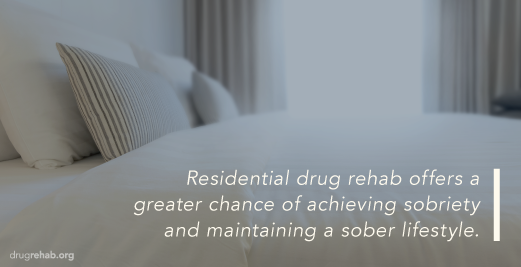
Many types of drug and alcohol rehab programs exist, but none help individuals overcome severe or persistent addiction more than residential, or inpatient, treatment. The National Institute on Drug Abuse reports that individuals who get into treatment, and remain in it, see:
- decreased or stopped the use of drugs or alcohol
- decreased or stopped criminal activity
- an improvement in social, psychological, and occupational functioning
Some forms of addiction may be successfully treated in an outpatient, intensive outpatient, or partial hospitalization program. However, for people with severe addiction, physical dependence, or addiction to more potent drugs, treatment within a residential drug and alcohol rehab center offers a greater opportunity of not only achieving sobriety but learning to live and maintain a sober life.
What Is Residential Addiction Treatment?
The most effective types of residential addiction treatment programs combine various types of therapy, counseling, education, and medication as needed. In a residential addiction treatment program, these types of treatment are administered on a daily basis since the patients stay on-site at the facility.
People with severe addiction or physical dependence often require removal from their home environment in order to get well. The usual, home environment is typically filled with triggers, bringing with them a greater chance of relapse when a person tries to overcome addiction on their own or participates in an outpatient form of treatment.
Inpatient addiction treatment programs allow patients to be surrounded by the components of treatment every day, according to their own, individual needs.
Are you or a loved one suffering from addiction?
Don't wait, get the best treatment options today
Call Now: (833) 473-4227Components Of A Residential Addiction Treatment Program
Residential addiction treatment programs provide round-the-clock, daily care in a healing environment where the sole focus is healing from addiction and related issues. These programs offer a wide array of services to ensure all are working to give each individual the best skills, tools, and behavioral abilities necessary to seek a substance-free life following treatment.
Components of a successful residential addiction treatment program often include the following:
- Medically-supervised detoxification and withdrawal, if necessary
- Medically-assisted treatment (MAT), if needed
- Access to various types of therapy
- Family and/or individual counseling
- Aftercare support
Medically-Supervised Detoxification And Withdrawal
Detoxification and withdrawal deal with helping a person heal from the physical part of addiction. Drug or alcohol abuse can be quite taxing on a person’s body, especially for those who have been abusing substances for an extended number of months or years.
People who have developed a physical dependence on a drug, and try to stop the use of it, will experience withdrawal symptoms. These will range in severity based on the drug of abuse, duration of abuse, the frequency of abuse, dosage, the person abusing it, and overall health.
Mild withdrawal symptoms can include a headache and nausea, while withdrawal from certain drugs may cause seizures, hallucinations, delirium tremens, fever, and can cause stopped breathing or heart rate.
For these reasons, it’s important that a person never try to detox without medical assistance. Medically-supervised detoxification and withdrawal services provide daily, 24-hour care for individuals in detox. Medical professionals can monitor vitals, administer medication to help with symptoms of withdrawal, and monitor health issues, such as vitamin and other nutritional deficiencies, which can occur during withdrawal.
Medically-Assisted Treatment
Following a medical detox, individuals are ready for formal treatment in therapy. Detox is only the first step in addiction treatment; after treating a person’s physical health, he or she can then move on to healing from the emotional, behavioral, and psychological effects of addiction in therapy, counseling, and other forms of treatment.
Medication-assisted therapy is a form of treatment which utilizes medication when needed and combines it with therapy. For example, many people in treatment for opioid addiction need to taper off the use of the substance in order to avoid relapse. Instead of continuing to use the harmful, addictive substance, medication-assisted therapy employes a medication with similar effects and far less risk of addiction or dependence, such as Suboxone.
Access To Various Types Of Therapy
Addiction treatment has come a long way in the last few decades, and residential drug rehab programs offer access to a number of therapies. Some are behavioral therapies, such as Cognitive behavioral therapy (CBT) or Dialectical behavior therapy (DBT), while others are alternative forms of therapy, such as holistic therapy.

Behavioral therapies aid individuals in identifying harmful behaviors which led to or contributed to addiction and in developing new, healthy behaviors for the future.
Holistic therapy focuses on treating the whole individual, often with a more natural approach, such as without the use of medication and focusing more on peer and group support and natural methods like yoga, mindfulness, and meditation.
Family And Individual Counseling
When a person struggles with addiction, it tends to affect everyone around them. So, when a person is in recovery from addiction, it’s important that family and loved ones have access to education, resources, and counseling to help support their loved one as much as possible.
Individuals in addiction treatment will attend counseling on an individual level to work through issues which occurred both during addiction and before. Group counseling brings together individuals in treatment so they can learn from each other’s experiences and feel the support of others who are on a similar journey.
Aftercare Support
No matter the length of a residential drug rehab program, treatment is never complete when a treatment program ends. That is, addiction is a chronic illness which requires long-term management. Following a residential treatment program, individuals should seek support from self-help groups, like Alcoholics Anonymous or Narcotics Anonymous.
Many inpatient drug rehab centers will provide patients with access to peer support in connecting alumni of the programs. The facilities often connect patients with resources for aftercare support, too, such as contacts for self-help groups, sobriety sponsors, and education and local resources for addiction treatment.
Some people may also choose to “step down” from an inpatient treatment program to an outpatient treatment program. For people who are ready to move on to the next phase of treatment, but not to leave treatment, stepping down is a great way to continue necessary therapy and counseling while returning to normal life.
Others may elect to participate in a partial hospitalization or intensive outpatient program, in which they attend treatment for a specified time each day and a specified number of days per week. These programs work much like residential programs, except that individuals go home each day. For this reason, these programs often work best when used in the step-down method as continued addiction treatment care.
Length Of Residential Addiction Treatment
Each individual will require a different length of time in order to make necessary changes to overcome addiction. Some may find a short-term program (28 to 30, 60, or 90 days) sufficient to learn to manage their addiction, while others may need a longer stay of 120 days, six months, one year, or more.
The most important factor in deciding treatment length is that a person is progressing as needed and gaining the skills, behavioral changes, and mental and physical strength to maintain sobriety after completing treatment. A clinical assessment is typically provided prior to treatment to help determine the length of a program a person will need.
Residential treatment programs can be adjusted as needed for a person’s needs. For example, a person with a dual diagnosis, or a co-occurring substance use or mental health disorder, may require a long-term program to learn to manage both disorders at the same time.
How To Cover The Cost Of Inpatient Addiction Treatment
Cost of inpatient addiction treatment is often covered, at least in part, by many insurance plans. For copayments or for people who have to use cash or private pay, many inpatient treatment centers offer payment plans, such as sliding fee scales, to help front the overall cost.
For people who have no insurance or cannot pay with cash, some rehab centers work with individual lenders to provide private loans or accept outside private loans for payment. Beyond these options, some rehab centers and private foundations offer scholarships to cover the cost of drug and alcohol rehab, and certain federal grants exist to help individuals secure treatment.
How To Find A Residential Drug And Alcohol Rehab Center
Residential drug and alcohol rehab centers exist to aid individuals in overcoming their addictions, dependencies, and any co-occurring mental health issues. Residential programs which contain the important treatment components are most likely to help addicted individuals not only heal from addiction but to continue to maintain sobriety long-term.
Learn more about residential drug and alcohol rehab programs today. Your call will be completely confidential.
For More Information Be Sure To Check Out These Additional Resources From DrugRehab.org:
- Inpatient Drug Rehab
- Year-Long Drug Rehab Programs
- How Do I Get My Loved One Into Rehab?
- How Effective Is A 30-Day Inpatient Drug Rehab Program
Sources:
National Institute on Drug Abuse — How Effective Is Drug Addiction Treatment?

